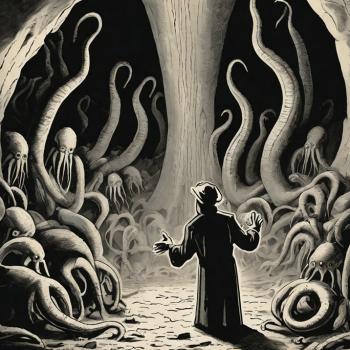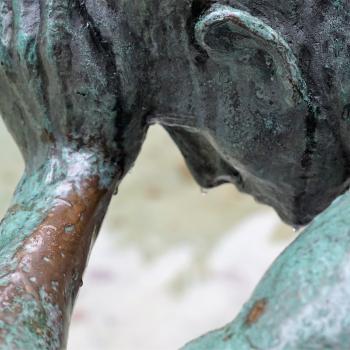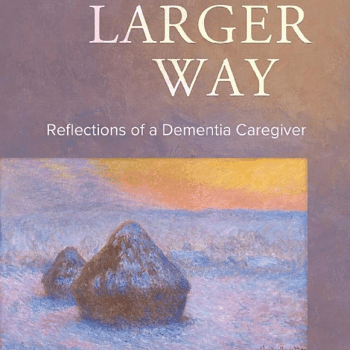Working as I do in the wood between the worlds of religion, I am daily immersed in the conversations within various believing and non-believing traditions. Broadly speaking, and with notable exceptions, there are three kinds of essays.
Some are conversations within the tradition, either addressing internal matters pertinent to that tradition or commenting on external events, public conversations, or cultural trends from the perspective of that tradition. I call this “dinner with mom, dad, and the crazy first-cousin-once-removed” sort of post. It’s like the meal table where family, the ones you get and the ones you really don’t get, comes together, shares favorite dishes, and talks about their common memories, their various interests. Someone at the table may be thought certifiably wacko within the complex relationships of family, but he or she is still family, and everyone makes room for that voice. Examples of these kinds of essays include the complaints about the worship wars for the Evangelicals; the descriptions of solstice rituals for the Pagans; remembering sukkot stories for the Jews; the meaning of rosary devotions for the Catholics; Hajj experiences for the Muslims, etc.
A second type of post is the finger-pointing post, where the writers express everything from careful curiosity to befuddlement to strong aversion as they hold up an example, public or private, of someone or something from a different tradition. I call this the “lookie-loo” sort of post, as the author “drives by” what he or she perceives to be an inexplicable belief anomaly. In its genial form, it can be like a dog hearing an odd sound and cocking his head in question. What’s that? Huh? In its virulent form, it can be both pointed and painful. An Atheist writer points out the science teacher in Mississippi teaching creationism; a Progressive writer describes the long-term fallout of Evangelical hermeneutics; a Catholic writer examines the United Methodist faith of Hillary Clinton, etc.
The third type of post is the persuasion post, in which someone points out why their faith/non-faith is the most rational, reasonable, and obvious posture. These posts can address general apologetics, or specific elements within a tradition—for example, “the clarity of Catholic faith and practice” or “why Hell is real” or “the moral grounds of secularism.” Some write to proselytize, and thus direct their comments to the outsider; others write to insiders to confirm shared convictions or persuade the kooky great-uncle that’s in the family but on the fringe that he should shape up. But either way, the posts describe evidence, walk the reader through arguments, point out inconsistencies and discrepancies in other positions, and generally express the faith posture of the writer. I call this the “pulpit” post, because the writer takes the opportunity to call out passersby and draw readers into their worldview, like London’s Speakers’ Corner.
These third type of posts can be tedious or provocative, compelling or very much not so, but they’re invariably revealing about the writer in curious (to me) ways. They often include a “conversion” element, with some attempt to clarify the writer’s journey from one faith position to another.
So, for example:
A Catholic writer tells about her conversion from Evangelicalism to Catholicism, and explains it, in part, thus: “Growing up Evangelical, I never heard anything really about what Catholics believed or why, but when I actually studied the history of the Church and read some of the early Church writers, it became obvious that the Catholic Church was the only true church.”
An Atheist writer, raised in the Presbyterian Church, discovers in his studies of philosophy and science the “truth” about the world and about Christianity, and abandons faith. “I was pretty devout as a teenager, but when I got to college I was assigned Darwin’s The Origin of Species and it was like a light went on. Further studies in science, and then encountering Daniel Dennett’s works made it pretty clear: there is no god in the skies.”
A Pagan writer reads the old Norse stories and “awakens” to their power and the reality of the old gods. “I never really understood the power of the gods, or the ways they impact our lives until I encountered Freyr. His story shook me to the roots, and convinced me that this was the path for me.”
An Evangelical explains his convictions because once he really studied the Bible carefully and correctly, he found the truth. “My parents were Catholic, in a general sort of way, and we went to Mass occasionally. But in college I met a guy with InterVarsity, and he invited me to a Bible study. There I read the gospels, and it all fell into place—it’s not about good works or any efforts at all; it’s about grace, pure and simple.”
Every tradition has examples of this transition. Mormons call this “bearing testimony,” and their accounts too resonate with an internal conviction—abrupt or growing—based on personal study and a sense of spiritual leading until they feel ready to stand up and declare their convictions.
They all seem quite honest, authentic accounts of an individual’s experience and conclusions. But they really don’t explain anything.
The actual experiences described are fairly common; it’s the conclusions that are curious. “X happened, and therefore I came to believe Y.” How does that work?
Many Evangelicals have studied church history and have not concluded that the Catholic Church is the only or true church. Many Catholics have studied science, read The Origin of Species, and go on to careers in science, and yet have not lost their faith. Many secularists have read the Bible, and didn’t find it believable.
Catholics have become Evangelicals; Evangelicals have become Orthodox; Progressives have become Atheists; Pagans have become Christian; Atheists have become Catholic. Is there any piece of knowledge that is certain to compel conviction, one way or the other? No.
Our bloggers relish the conversion stories that tell of someone coming to their own convictions, and the bigger the name, the more confirmation it brings. E.O. Wilson, brilliant biologist, raised Baptist goes to college, reads deeply in science, and subsequently drifts from faith. Malcolm Muggeridge, an urbane British agnostic, discovers the testimonies of Catholic saints and writers, and joins the Roman Church. Lee Strobel, atheist journalist, meets Christ and becomes an Evangelical. Charles Templeton, an evangelist traveling with Billy Graham, loses faith and abandons the mission. Alexander Solzhenitsyn, Soviet atheist, converts to Christianity. C.S. Lewis, the famed “reluctant convert,” abandons his atheist posture and moves from theism to devout Christian belief. Malcolm X, raised Baptist, becomes convicted by the message of the Nation of Islam, and then, later, to Sunni Islam. Ayaan Hirsi Ali, Somalian Muslim, leaves Islam for Atheism.
Each of these has a story, which includes similar components: key experiences, studies, conversations, discoveries, and conclusions.
In Orthodoxy, G.K. Chesterton writes, “If I am asked, as a purely intellectual question, why I believe in Christianity, I can only answer, ‘For the same reason that an intelligent agnostic disbelieves in Christianity.’ I believe in it quite rationally upon the evidence.” We’re all confronted with certain pieces of evidence, and yet we reach radically different conclusions.
There’s a conundrum here, a mystery that we can only recognize with peripheral vision. Internally, of course, we all have our explanations, and invariably (if you’re a person of some kind of faith), it has a lot to do with the divine communicating with you and calling you into belief or enabling you to believe, but then we have to deal with the painfully obvious disconnects between our radically different beliefs.
Everyone believes something. How do we explain this, leaving aside divine initiative for the time being?
I’m not even beginning to try here, but I do think that there is something to be said about the role of desire. Wanting something to be true does not make it true, of course. Our desires don’t dictate reality, but our desires certainly must play a role in interpreting that reality.
Jesus recognized this key factor in the human story. He’s consistently asking people he encounters: What do you want? What are you looking for? And just as we see on the road to Emmaus, despite all the “evidence” he lays out for his road companions’ consideration, he’s ready to pass on. He waits for the invitation. “Please stay with us.”
Image courtesy of Shutterstock.com.

















